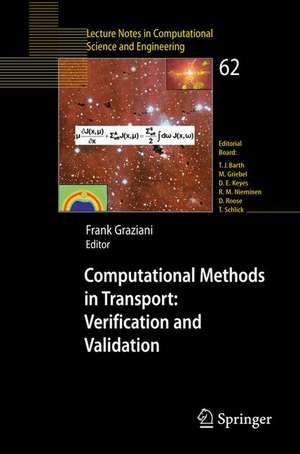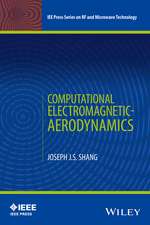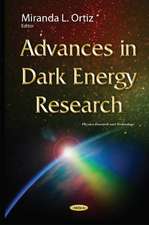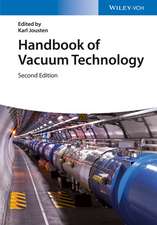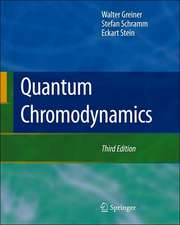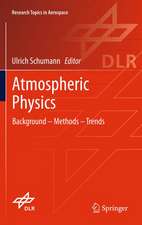Computational Methods in Transport: Verification and Validation: Lecture Notes in Computational Science and Engineering, cartea 62
Editat de Frank Grazianien Limba Engleză Paperback – 4 iun 2008
Din seria Lecture Notes in Computational Science and Engineering
-
 Preț: 375.63 lei
Preț: 375.63 lei - 18%
 Preț: 1247.70 lei
Preț: 1247.70 lei - 18%
 Preț: 787.15 lei
Preț: 787.15 lei -
 Preț: 384.31 lei
Preț: 384.31 lei - 20%
 Preț: 990.95 lei
Preț: 990.95 lei - 15%
 Preț: 648.56 lei
Preț: 648.56 lei - 15%
 Preț: 653.00 lei
Preț: 653.00 lei -
 Preț: 405.28 lei
Preț: 405.28 lei - 18%
 Preț: 976.06 lei
Preț: 976.06 lei - 18%
 Preț: 968.82 lei
Preț: 968.82 lei -
 Preț: 397.97 lei
Preț: 397.97 lei - 18%
 Preț: 962.49 lei
Preț: 962.49 lei - 15%
 Preț: 647.08 lei
Preț: 647.08 lei - 15%
 Preț: 648.56 lei
Preț: 648.56 lei - 15%
 Preț: 649.54 lei
Preț: 649.54 lei - 18%
 Preț: 1389.30 lei
Preț: 1389.30 lei -
 Preț: 428.30 lei
Preț: 428.30 lei - 18%
 Preț: 1240.62 lei
Preț: 1240.62 lei - 20%
 Preț: 666.27 lei
Preț: 666.27 lei - 15%
 Preț: 654.43 lei
Preț: 654.43 lei - 15%
 Preț: 644.30 lei
Preț: 644.30 lei - 18%
 Preț: 957.62 lei
Preț: 957.62 lei - 18%
 Preț: 1224.18 lei
Preț: 1224.18 lei - 18%
 Preț: 904.11 lei
Preț: 904.11 lei - 18%
 Preț: 1242.83 lei
Preț: 1242.83 lei - 20%
 Preț: 992.11 lei
Preț: 992.11 lei - 15%
 Preț: 642.83 lei
Preț: 642.83 lei - 18%
 Preț: 954.45 lei
Preț: 954.45 lei - 18%
 Preț: 783.20 lei
Preț: 783.20 lei - 18%
 Preț: 949.42 lei
Preț: 949.42 lei - 15%
 Preț: 642.83 lei
Preț: 642.83 lei - 18%
 Preț: 964.86 lei
Preț: 964.86 lei - 18%
 Preț: 1260.83 lei
Preț: 1260.83 lei - 15%
 Preț: 650.37 lei
Preț: 650.37 lei
Preț: 646.62 lei
Preț vechi: 760.73 lei
-15% Nou
Puncte Express: 970
Preț estimativ în valută:
123.74€ • 129.03$ • 102.84£
123.74€ • 129.03$ • 102.84£
Carte tipărită la comandă
Livrare economică 20 martie-03 aprilie
Preluare comenzi: 021 569.72.76
Specificații
ISBN-13: 9783540773610
ISBN-10: 3540773614
Pagini: 310
Ilustrații: X, 332 p. 77 illus., 42 illus. in color.
Dimensiuni: 155 x 235 x 24 mm
Greutate: 0.59 kg
Ediția:2008
Editura: Springer Berlin, Heidelberg
Colecția Springer
Seria Lecture Notes in Computational Science and Engineering
Locul publicării:Berlin, Heidelberg, Germany
ISBN-10: 3540773614
Pagini: 310
Ilustrații: X, 332 p. 77 illus., 42 illus. in color.
Dimensiuni: 155 x 235 x 24 mm
Greutate: 0.59 kg
Ediția:2008
Editura: Springer Berlin, Heidelberg
Colecția Springer
Seria Lecture Notes in Computational Science and Engineering
Locul publicării:Berlin, Heidelberg, Germany
Public țintă
ResearchCuprins
Verification (Mostly) for High Energy Density Radiation Transport: Five Case Studies.- A General Strategy for Physics-Based Model Validation Illustrated with Earthquake Phenomenology, Atmospheric Radiative Transfer, and Computational Fluid Dynamics.- Spectral Solvers to Non-Conservative Transport for Non-Linear Interactive Systems of Boltzmann Type.- The Art of Analytical Benchmarking.- Implicit Monte Carlo Radiation Transport Simulations of Four Test Problems.- The Prompt Spectrum of a Radiating Sphere: Benchmark Solutions for Diffusion and Transport.- Some Verification Problems with Possible Transport Applications.- Canopy Reflectance Model Benchmarking: RAMI and the ROMC.- Uncertainty and Sensitivity Analysis for Models of Complex Systems.- A Brief Overview of the State-of-the-Practice and Current Challenges of Solution Verification.- Expert Panel Opinion and Global Sensitivity Analysis for Composite Indicators.- A Practical Global Sensitivity Analysis Methodology for Multi-Physics Applications.
Textul de pe ultima copertă
The focus of this book deals with a cross cutting issue affecting all particle transport algorithms and applications; verification and validation (V&V). In other words, are the equations being solved correctly and are the correct equations being solved? Verification and validation assures a scientist, engineer or mathematician that a simulation code is a mirror of reality and not just an expensive computer game. In this book, we will learn what the astrophysicist, atmospheric scientist, mathematician or nuclear engineer do to assess the accuracy of their code. What convergence studies, what error analysis, what problems do each field use to benchmark and ascertain the accuracy of their transport simulations. Is there a need for new benchmark problems? Are there experiments that can be used to help validate the simulation results? If not, are there new experiments that could address these issues? These are all questions raised in this proceedings of the Second Computational Methods in Transport Workshop.
Caracteristici
Includes supplementary material: sn.pub/extras
